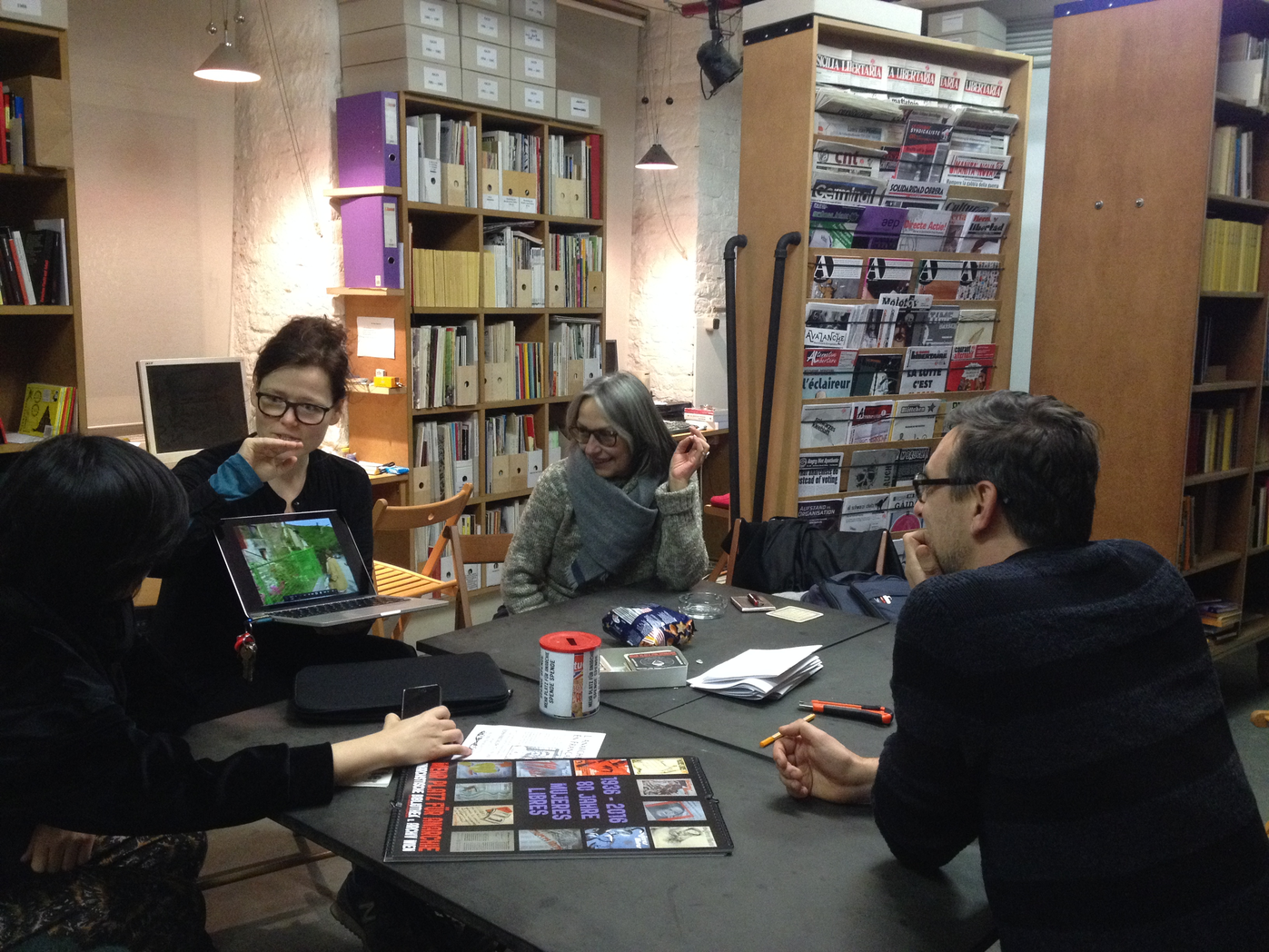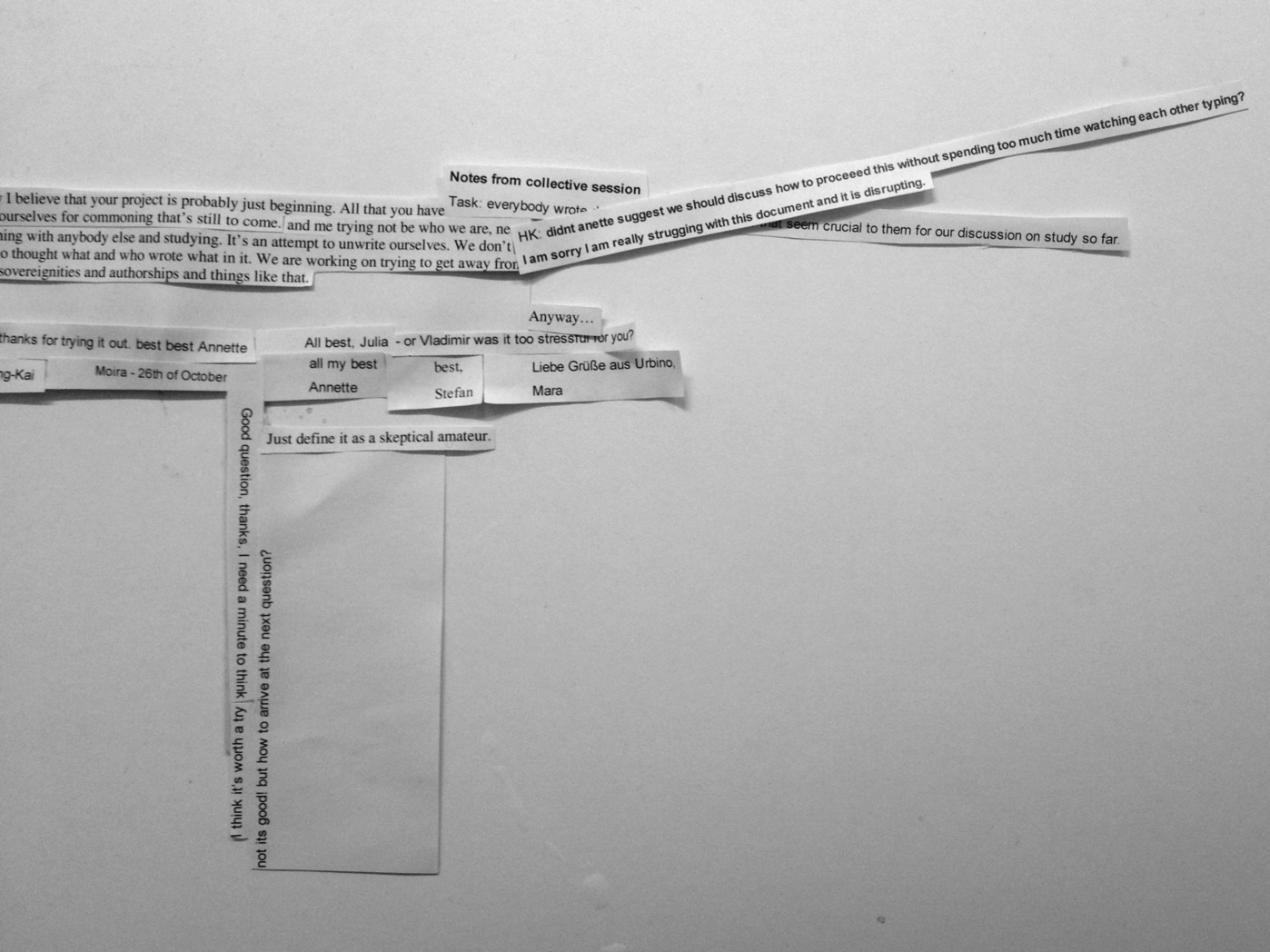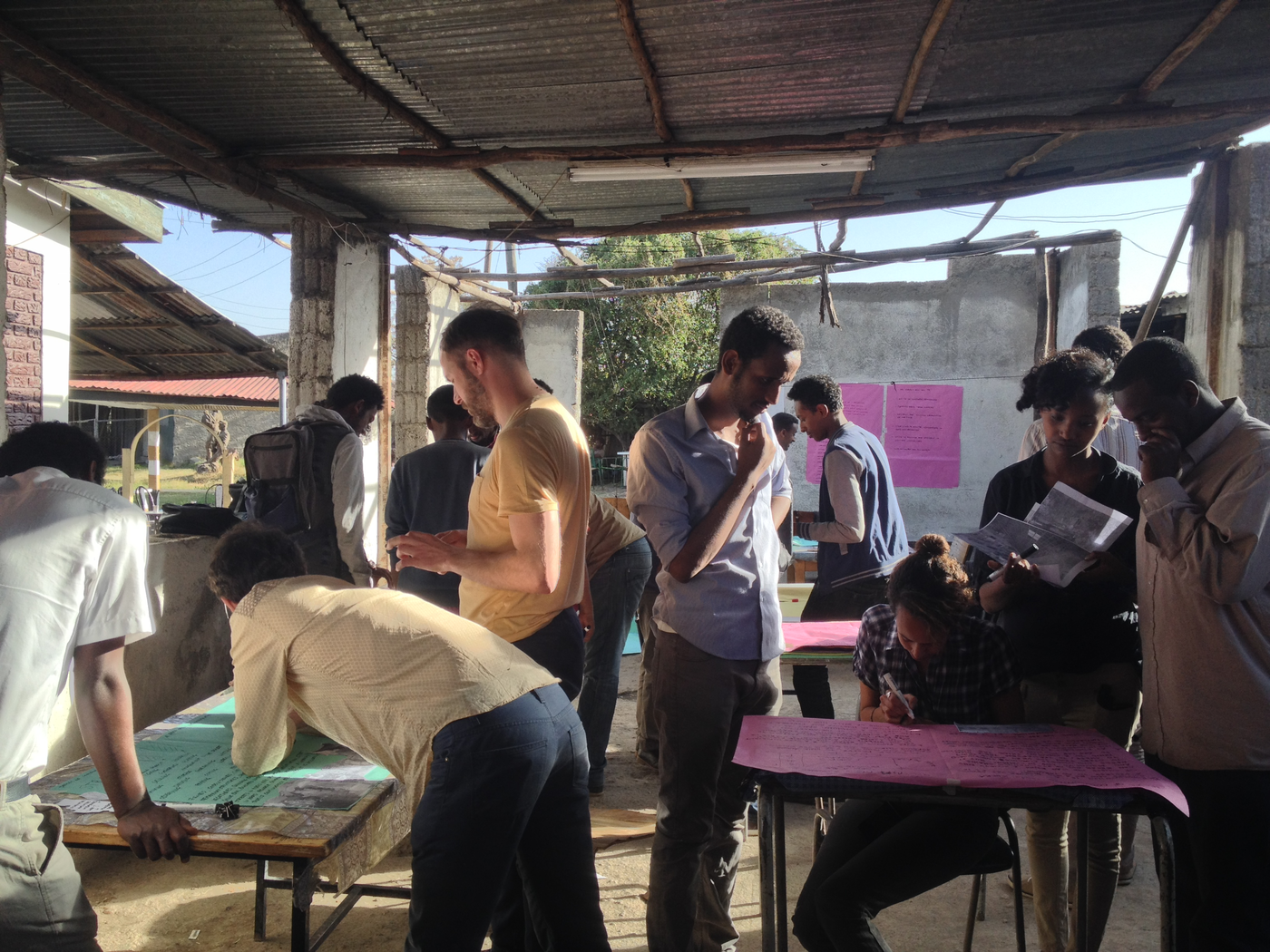Study of/as Commoning
Anette Baldauf, Vladimir Miller, Annette Krauss, Mara Verlic, Moira Hille, Hong-Kai Wang, Mihret Kebede Alwabie, Julia Wieger, Tesfaye Beri Bekele and Stefan Gruber
To publish an article in a journal, especially a peer-reviewed journal, requires the identification of the name of the author or the names of several authors. How to deal with this requirement if the subject of that article is commoning? In other words, if that article is trying to explore the potentialities, and also limitations, of what it might mean to come together in a multiplicity of voices?
This contribution is the result of an ongoing struggle to negotiate the concept of a singular authorship; it is a reflection on the minor successes and manifold failures to expand, implode and reconfigure the idea of an author by taking seriously the acknowledgement that any project, and a project on commoning in particular, is nourished by innumerous sources, most of which are rendered invisible when an article is submitted. The text is an effort to spell out the contributions and take seriously the many, often tenacious and augmented, strata of offerings that allowed our reflection on the commons to solidify.
Who are these multiple voices, and how to be attentive to the flux of these voices moving in and out of the project over time? We all met in Vienna, Austria or Addis Ababa, Ethiopia (either living there or visiting). The framework of this encounter was a research project funded by the Vienna Science and Technology Fund (WWTF 2014–2016) entitled ‘Spaces of Commoning. Artistic Practices, Urban Commons and Visions of Change’. The project provided financial support for four researchers (part-time): Mara Verlic from Vienna, Austria, Annette Krauss from Utrecht, Netherlands, Vladimir Miller from Berlin, Germany and Hong Kai Wang from Taipeh, Taiwan. The project also affiliated three employees of the Academy of Fine Arts Vienna: Stefan Gruber, Anette Baldauf and Moira Hille, as well as Julia Wieger, who didn’t receive any financial support during the first year but was employed in the second year by the Academy of Fine Arts Vienna.
The group was composed of scholars from the visual arts (socially engaged art, performance, film, sound art), architecture and social theory. Hong-Kai Wang was the only permanent member of the research team offering a non-European and non-Western perspective; the majority of the group had grown up in the Global North, many under the reign of the individualism of the free market economy of capitalism. Few had experienced the collectivism of state socialism.
Building on existing institutional connections, the research project collaborated with the Alle School of Fine Arts and Design at the University of Addis Ababa, Ethiopia. The Academy of Fine Arts Vienna invited artists, architects and theorists from Addis to discuss their work at a conference in Vienna in January 2015, and members of the research team visited the Alle School in April of the same year. Berhanu Ashagrie, an artist from Addis, and Anette Baldauf, a theorist from Vienna, co-taught a seminar on commoning at the Forum Alpbach, which invited five students from Ethiopia to visit Alpbach and then Vienna. Among them were Tesfaye Beri Bekele, and Mihret Kebede Alwabie. Today, Berhanu Ashagrie and Mihret Kebede currently work and/or study at the Academy of Fine Arts Vienna. Anette Baldauf continues to teach seminars at the Alle School. The collaboration within and across borders and time has been precious, precarious and fraught with the weight of colonial structures.
Many have participated in the making of this article, but in the course of submitting this contribution we differentiated between those who were engaged in conceptualizing, drafting and writing the article (see authors listed above), and those who participated in workshops and public discussions during the research process and kindly gave their permission to include their voices in the workshop discussion transcripts. The names of these participants are mentioned at the beginning of the subchapters, ‘Study Across Borders’ and ‘Study Across Time’.
The contributors to ‘Study Across Borders’ include students and lecturers of the Alle School of Fine Arts and Design and the Ethiopian Institute of Architecture, Building Construction and City Development (EiABC) at the University of Addis Ababa: Fasil Giorgis, Dawit Girma, Martha Halle Hagos, Ermyas Legesse, Shalom Lemma, Emnet Woubishet and Helen Zeru.
The contributors to ‘Study Across Time’ are protagonists in Vienna, who were invited based on their expertise on the settlers’ movement or due to their activism around self-organisation, cooperatives or commoning in the city: Andreas Gautsch, Ernst Gruber, Elisabeth Kofler, Michael Klein, Peter Krobath, Karin Lischke, Maria Mesner, Gerhard Rauscher and Tina Wintersteiger.
Study Across Borders: Detail from a zine produced in a workshop in 2015 in Addis Ababa by the Spaces of Commoning research group and participants from the Alle School of Fine Arts and Design, Addis Ababa University, photo: Stefan Gruber, 2015
Study Across Borders: Zine workshop in 2015 in Addis Ababa with the Spaces of Commoning research group and participants from the Alle School of Fine Arts and Design, Addis Ababa University, photo: Stefan Gruber, 2015
We, the core group of this JAR exposition, tried to stay with the trouble, to listen, to talk and to write. While, in the beginning, the financial resources of the research grant enabled many people to be involved in the project, at this point — after three rounds of revisions over two years — the group has shrunken to a very small number. Now, those who are revising the exposition are Anette Baldauf, Annette Krauss, and Moira Hille, all employed in academic institutions, as well as Vladimir Miller und Julia Wieger, who are freelancing. As we have worked on the latest iteration, we have tried to hold onto the cacophony of different voices, and writing with them has sustained the making of this text; but now, with time and reviews passing, we feel drained and fight against the conventions of academic writing taking over. The unpaid labor of many continues to support our writing, as they reflect and comment on it — yet we, as mentioned above, revise on behalf of the group. Because of this complex constellation, the ‘we’ you encounter in the text is always contextual as much as contingent; you, the reader, will make sense of it again and again. Just as we did in the various stages of (re-)writing.



